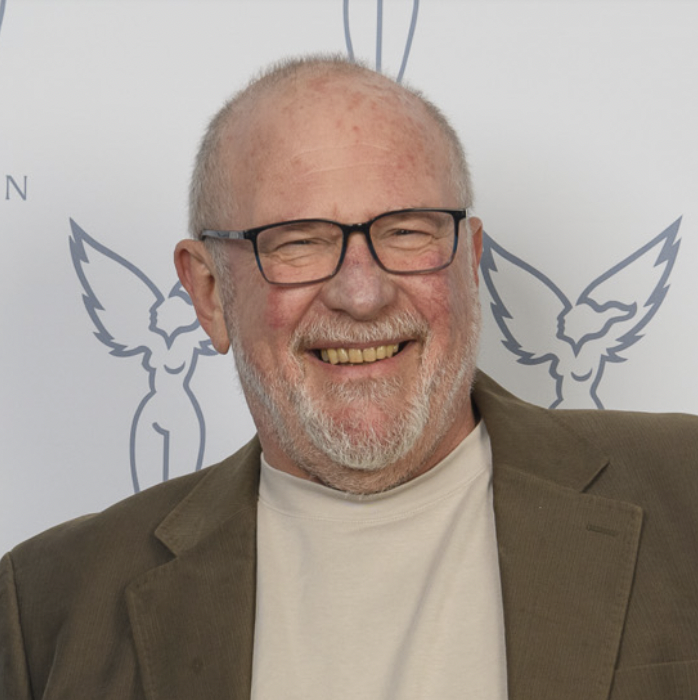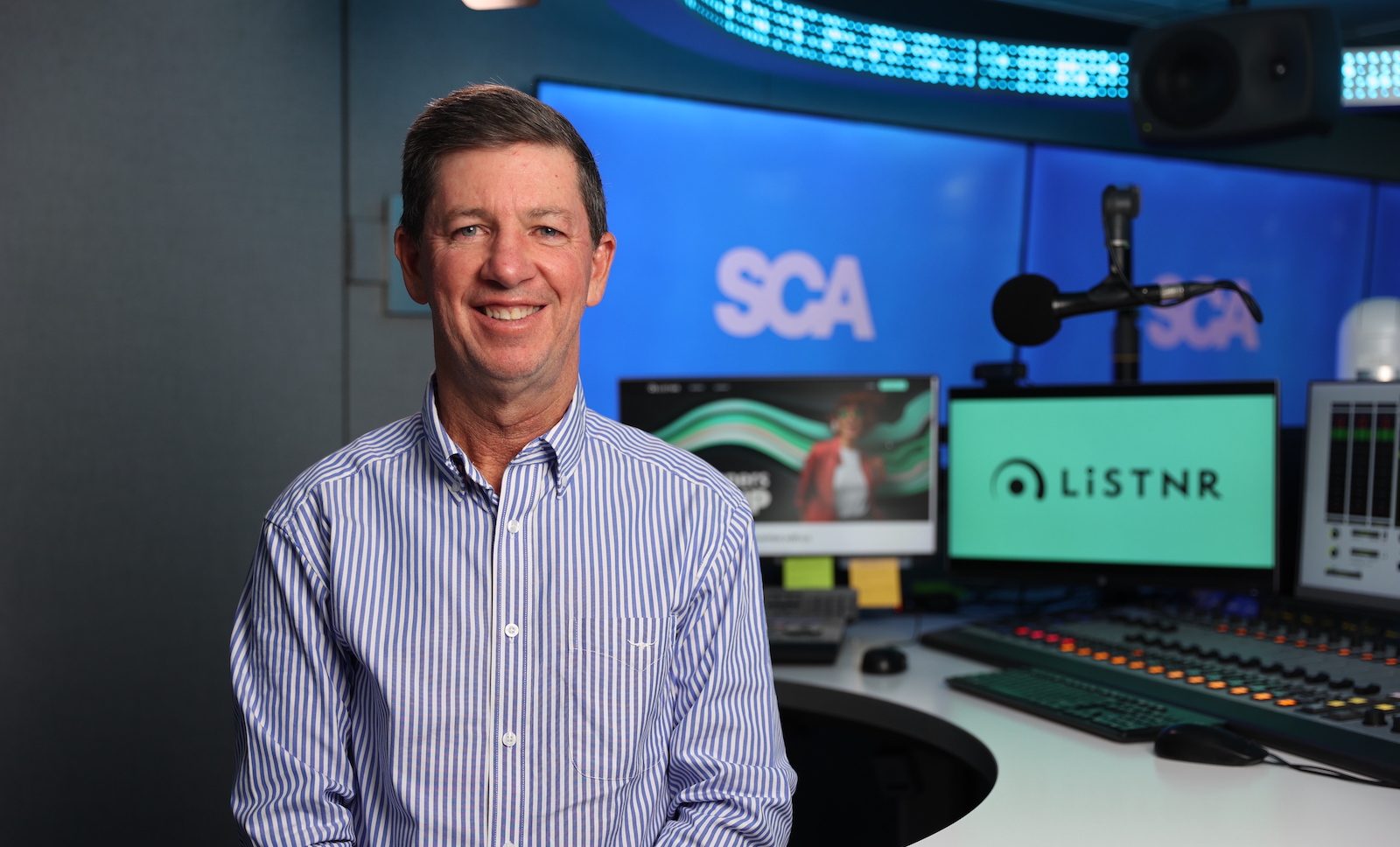SCA’s John Kelly talks a big game with Peter Saxon –
There’s something you should know about SCA’s new CEO and Managing Director, John Kelly’s past.
Early in his career he was a manager at accounting firm KPMG, so he knows something about money.
Then, for 16 years, he was Group CFO for Ten Network Holdings which means he knows something about television and money.
Most recently, Mr Kelly spent seven years and seven months as COO of SCA before taking over the CEO role from Grant Blackley. So, now, he knows something about audio, television and money – which all comes in handy for running a media conglomerate in 2023.
But on Wednesday night, on the eve of his very first presentation as SCA CEO of the full year financial results to media and shareholders, none of that mattered. The only item on that glittering resume that came into play as he watched England oust the Matildas from the Women’s World Cup was his four-year stint in the C-suite at Football Federation Australia. As it turns out, he knows a thing or two about football too.
So, when I called Mr Kelly yesterday to talk about SCA’s annual financial report, I couldn’t help asking…
radioinfo: I’m amazed that you can still have a voice after last night’s match.
John Kelly: Yeah, I was really excited for the game. But I’m really excited for the whole of football, to be honest with you. I mean, I was doing a CBA ( Cost Benefit Analysis) for the Matildas and for the W-League nine years ago. And it was the most difficult negotiation because I truly believed in what they wanted and what they required. But, you know, it’s the magic pudding of football in terms of finding enough funding. And yes, I’m really pleased for them that they’re starting to get their just desserts.
radioinfo: So, would that have been the speech you might have delivered next day if you were the CEO of FFA now?
John Kelly: (laughs) That’s true. But I’m not.
radioinfo: So how do you characterise today’s SCA results?
John Kelly: As you know, Peter, I took over from Grant as of the 1st of July. Today’s results, I can only refer to as a pass mark.
SCA Radio Results Summary:
-
- Broadcast radio revenue of $372.8M was steady (down 1.2%). Metro radio advertising was fractionally up, regional down 4.6%, largely due to a decline in Government spending.
- LiSTNR revenue increased 36.2% to over $21 million. With more than 8 million monthly listeners, LiSTNR’s EBITDA (earnings before interest, taxes, depreciation and amortisation) loss for the year was reduced by over 30%.
- Overall Group revenues were down. Audio was marginally up (0.3) but offset by overall television decline of 14.5%
- Active cost control saw a 1.3% reduction in non-revenue related expenses.
- A fully franked dividend of 2.2 cents per share will take the full year dividends to 6.80 cents per share.
John Kelly: In terms of audio, we’ve done a pretty good job. We’ve increased our audience across Metro radio to 6.2 million. Number one, 25 to 54 network. We’ve been able to increase our overall national audience footprint to over 9 million people.
We’ve been able to increase our take up of digital audio in terms of LiSTNR growth to 1.5 million sign ups and 9 million streams. We’ve been able to increase our revenue by 36% and we’ve guided the market that we’re going to bring the up break-even point for LiSTNR one year earlier to the end of ‘24 and therefore profit in ‘25.
So, that result (for audio) we think was positive. in terms of TV, difficult. A difficult market and, particularly difficult for us, given our alignment with our major partner, Ten – Paramount. The market was down, number one. Secondly, we were hit further by revenue decline because unlike Nine and Seven, we don’t have a one stop shop to sell to national advertisers. They sell as a one stop shop, both metro and regional. We sell separately regional and Metro. That’s something we’re working on with Ten at the moment. We hope, in the very near future, we’ll be selling as a one stop shop to compete alongside our peers.
Also, to be honest with you, ratings performance was softer than the previous years, particularly in a premium product of sport and major programs.
radioinfo: It must be frustrating because as with audio, in television too, content is king, but you don’t have any say over it. And Ten is, I guess, the laggard in content as far as TV goes. How do you address that?
John Kelly: Well, we address that firstly by doing the things we can do, which is making the sale to national advertisers simple like our competitors. We’re also thinking about ways of doing our affiliation deal differently with Ten beyond 1st January next year. But look, to some extent you’re right. I mean, at the end of the day, what we do with the ten content and our good friends at Seven, with Tasmania as well, is that we effectively ingest the content, distribute the content and sell the content. We can’t put on The Voice, we can’t put on NRL or Matildas. That’s something that Ten makes the decision on, not ourselves..
radioinfo: Do you feel that television is still a great medium to be in, but you’ve got a problem with the Ten deal? Or is television in general in decline compared to audio?
John Kelly: Well, we make the observation: we’re all about audio. And certainly all our investment with capital expenditure, with people or time goes into our audio assets headlined by LiSTNR, as an audio destination.
With TV, it’s a maximisation game. Peter, I mean, we’ve got an asset there, which has been there, ever since I’ve been here. And the reality is, we understand the economics, but it’s all about how do we maximize the return? That’s what we’re trying to do. It’s not like we’re buying more – more content for TV or buying more licenses. We’re just trying to maximise the outcome from an asset sitting on our balance sheet.
radioinfo: Okay, let’s get back to the good news about audio. Broadcast radio is a bit down but remains relatively steady. And most people would agree conditions have been difficult for most of this financial year in selling radio or anything, for that matter. So, for Metro radio to be down 1.2%, is nothing really. But a 4.6% revenue drop in the regions is a little bit more worrying. What can you attribute to that?
John Kelly: The major decline is in our national advertisers in regional markets.
Look, I think there’s two things. One, as you know, the government has, whether it be federal, state or local, has been a large advertiser in the regions, not just in radio, but also in TV and print. And, I think we’re all bemoaning the lack of support we’re getting from the government in relation to distributing their messaging across those regions. So that’s the first issue.
And I just think that the general cost of living issues that has been impacting the spend levels of the nine million people in regional communities that is causing issues in relation to media spend. So, it’s a combination.
Look, we do believe there are better times ahead and we, like Seven did yesterday, have pointed to the fact that we very much expect things to improve in the second half of this fiscal.
TV is difficult, but actually with radio and digital audio, we’re very comfortable that consumption will continue to rise across all the networks, whether it be SCA, Nova or ARN.
radioinfo: Looking at LiSTNR now, and a 36.2% increase in revenue looks really great. Still, the $21 million revenue it actually generates looks minuscule compared to $372.8M for broadcast radio. How far do you think LiSTNR can grow?
John Kelly: Well, I think it’s lost sometimes that we’ve only been going with LiSTNR for about two years. So the fact that we’ve built the audience to 1.5 million sign-ups and the streams to 9 million in that time, we think is a very good performance.
Also, we have 800 podcasts, 500 partner podcasts. So, we think a significant upside is that we can talk about the audience growing from 3 million to 8 million on our podcast network and we can monetize all that. Well, we haven’t fully monetized that yet.
So, we’ve said that we grew 36% in 23. We say and we guide that we expect to grow at similar levels in 24 and we don’t think it stops there either. It’s going to be super growth and arguably the largest growth engine of any of the media assets moving forward.
What I think is lost on people when they talk about BVOD (Broadcast Video On Demand) being the growth engine of broadcast TV. Well, we can very much see that digital audio streaming and other activities will be the growth engine and sort of the on-demand moment for audio and for audio players. And I want to work collaboratively with the likes of Ciaran (Davis) at ARN and Peter Charlton at NOVA and all the other operators to grow the sea of audio and get our requisite share of voice, and particularly in the digital audio space.
radioinfo: John Kelly, thank you for your time.

Peter Saxon – Managing Editor


DAB+ digital radio has been transmitted in mainland capital cities for 14 years this month.
Since all AM/FM broadcasts in all capital cities, Gold Coast and Mandurah are also transmitted on DAB+, what is the financial and pollution effect of switching off;
36 AM and 32 FM ABC/SBS main transmitters,
36 AM and 61 FM commercial main transmitters,
12 AM and 50 FM community main transmitters?
nearly all are high powered transmitters.
78 % of new cars have DAB+ receivers installed prior to delivery. In Europe virtually all new cars have DAB+ receivers fitted. The most common listening location is within cars.